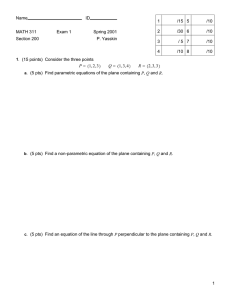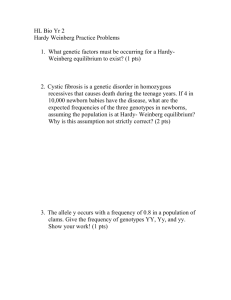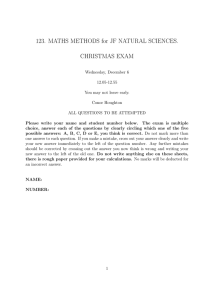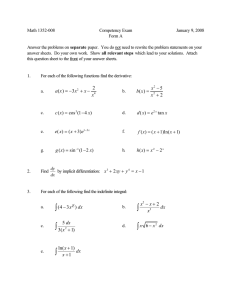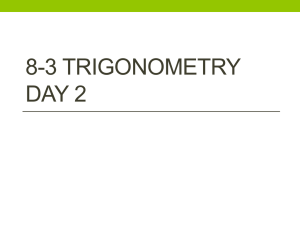Name ID 1 /15 5
advertisement
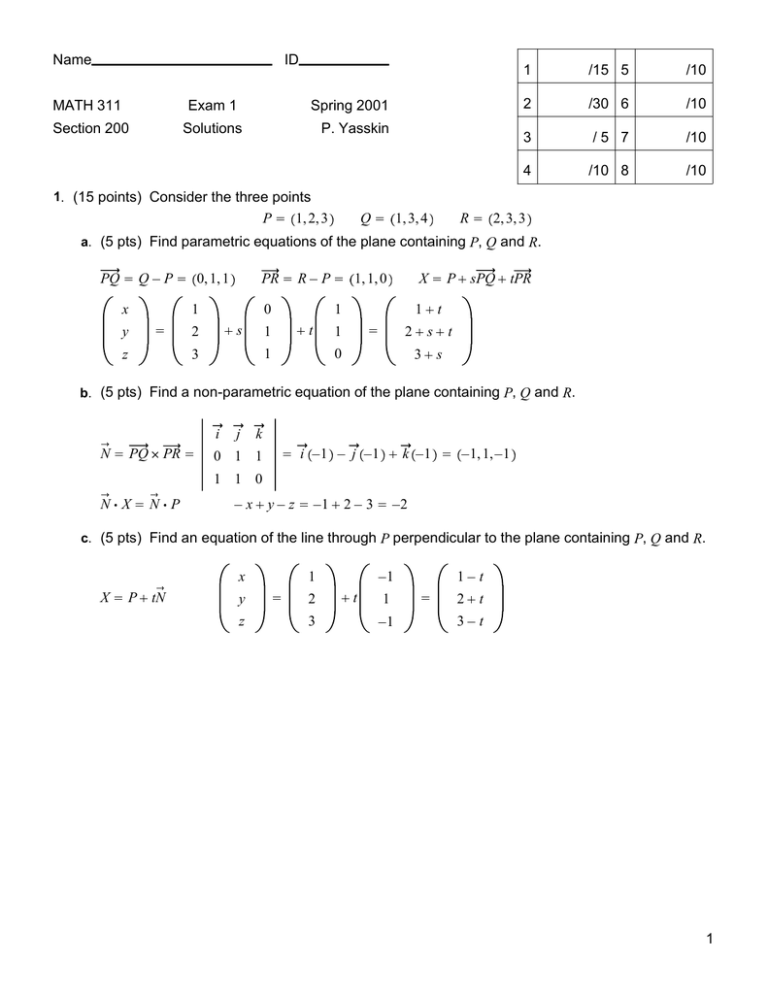
Name ID MATH 311 Exam 1 Spring 2001 Section 200 Solutions P. Yasskin 1 /15 5 /10 2 /30 6 /10 3 /5 7 /10 4 /10 8 /10 1. (15 points) Consider the three points P 1, 2, 3 Q 1, 3, 4 R 2, 3, 3 a. (5 pts) Find parametric equations of the plane containing P, Q and R. PQ Q " P 0, 1, 1 x y PR R " P 1, 1, 0 X P sPQ tPR 0 1t 1 z s 2 1 t 1 1 3 1 2st 3s 0 b. (5 pts) Find a non-parametric equation of the plane containing P, Q and R. PQ PR N i j k i "1 " j "1 k "1 "1, 1, "1 0 1 1 1 1 0 X N P N " x y " z "1 2 " 3 "2 c. (5 pts) Find an equation of the line through P perpendicular to the plane containing P, Q and R. X P tN x y z 2 3 1"t "1 1 t 1 "1 2t 3"t 1 2. (30 points) Consider the equations 2x 4y 6z 4 vy 2 wz b 2v w x 4y 4z 3 a. (5 pts) Write out the augmented matrix for this system. 0 0 2 4 6 4 1 0 0 1 0 2 0 1 0 0 1 b 2 1 1 4 4 3 b. (10 pts) For what value(s) of b do there exist solutions? 1 R and reorder rows : 2 1 R4 " 2R 1 " R 2 " R 3 ¯ R4 : 1 0 0 1 0 2 0 1 0 0 1 b 0 0 1 2 3 2 2 1 1 4 4 3 1 0 0 1 0 2 0 1 0 0 1 b 0 0 1 2 3 2 0 0 0 0 0 "3 " b So there are solutions only if b "3. c. (10 pts) For those value(s) of b, find all solutions. For b "3, the equations reduce to vy 2 w z "3 x 2y 3z 2 So y and z are arbitrary and the solution is 2"s v w x "3 " t 2 " 2s " 3t "1 2 "3 2 0 0 s "2 t "1 "3 y s 0 1 0 z t 0 0 1 d. (5 pts) Circle the geometric description of the solution set: point, line, 2-plane , 3-plane, 4-plane, R5 2 3. (5 points) In R 5 with coordinates v, w, x, y, z , write out an equation of the 3-plane through the point P 5, 4, 3, 2, 1 with tangent vectors a 2, 1, 3, 0, 4 b 1, "1, 2, "2, 3 v 5 2 1 2 w 4 1 "1 1 x 3 r s 3 t 2 c 2, 1, 3, "1, 0 3 y 2 0 "2 "1 z 1 4 3 0 4. (10 points) Duke Skywater is flying the Millennium Eagle along the curve rt 2 cos t, 3 sin t, t At t = , he releases a garbage pod which travels along his tangent line with constant velocity (equal 2 to his velocity at the time of release). Where is the garbage pod at t =? rt 2 cos t, 3 sin t, t r = vt "2 sin t, 3 cos t, 1 v = 2 cos = , 3 sin = , = 0, 3, = 2 2 2 2 = = "2 sin , 3 cos , 1 "2, 0, 1 2 2 The tangent line is r tan t r = v = x, y, z 2 2 At t =, the garbage pod is at r tan = 0, 3, = = x, y, z 2 2 2 2 t" = 2 0, 3, = 2 t" = 2 "2, 0, 1 "2, 0, 1 "=, 3, = 3 5. (10 points) Duke Skywater is flying the Millennium Eagle through the galactic polaron field. At t 20, Duke’s position is r 20, 10, 30 lightyears and his velocity is v .1, .3, .2 lightyears year . At that time, he polarons and the gradient of this density to be measures the density of polarons to be > 15 10 6 3 > 2 10 6 , "1 10 6 , 3 10 6 polarons lightyear 4 lightyear . a. What does he measure as the time rate of change the polaron density, d> ? dt d> > v 2 10 6 , "1 10 6 , 3 10 6 .1, .3, .2 .2 " .3 .6 10 6 .5 10 6 5 10 5 dt b. Using a linear approximation, what would he expect the polaron density to be at the point x 21, 12, 29 ? > x " r > tan x > r > tan 21, 12, 29 15 10 6 2 10 6 , "1 10 6 , 3 10 6 1, 2, "1 15 10 6 2 " 2 " 3 10 6 12 10 6 6. (10 points) Duke Skywater is flying the Millennium Eagle through the galactic hyperon field. At t 20, Duke’s position is r 20, 10, 30 lightyears and his velocity is v .1, .3, .2 lightyears year . At that time, he measures the hyperon field and its Jacobian to be 200 H 150 30 DH Hans "10 20 "40 10 5 "10 0 10 300 Hans lightyear a. What does he measure as the time rate of change the hyperon field, dH ? dt 30 dH v DH dt "10 20 3"34 .1 "40 10 5 "10 0 10 .3 .2 4 "4 3 1 "1 0 2 0 1 b. Using a linear approximation, what would he expect the hyperon field to be at t 22? a dH tan t H H t " a dt 200 4 tan 22 H 150 0 300 208 22 " 20 1 150 302 r tan 22 r tan 20 v20 22 " 20 20, 10, 30 2.1, .3, .2 20.2, 10.6, 30.4 OR ra DH rt " ra H tan r tan t H tan r tan 22 H 200 150 300 30 "10 20 "40 10 5 "10 0 10 .2 .6 .4 208 150 302 4 7. (10 points) Consider the vector space R of all positive real numbers with the operations of Vector Addition: x ¥ y xy (real number addition) ) Scalar Multiplication: )©x x (real number exponentiation) Translate each of the following statements into ordinary arithmetic. a. For all x we have 0 © x 0. For all x we have x 0 1. 0. b. For all a we have a © 0 For all a we have 1 a 1. c. If a © x 0 then either a 0 or x 0. If x a 1 then either a 0 or x 1. 8. (10 points) Consider the linear function L : R 3 ¯ R 2 given by 1 ; u 1 u 2 x u 3 x 2 dx L u 0 d u u 2 x u 3 x 2 dx 1 x1 Find the matrix A of the linear function, so that you can rewrite it as L u A u 1 1 L L L 0 ; 1 dx 0 d 1 dx 0 ; x dx 1 1 1 0 x1 0 0 d x dx 0 ; x 2 dx 0 0 1 2 1 x1 1 d x 2 dx 1 A 0 1 2 1 1 3 2 1 3 2 0 1 x1 OR 1 L u ; u 1 u 2 x u 3 x 2 dx 0 d u u 2 x u 3 x 2 dx 1 u1 u2 1 u3 1 2 3 u 2 2u 3 2 3 u1x u2 x u3 x 2 3 u 2 2u 3 x | x1 x1 1 0 1 2 1 1 3 2 u1 u2 u3 A 1 0 1 0 1 2 1 1 3 2 5
